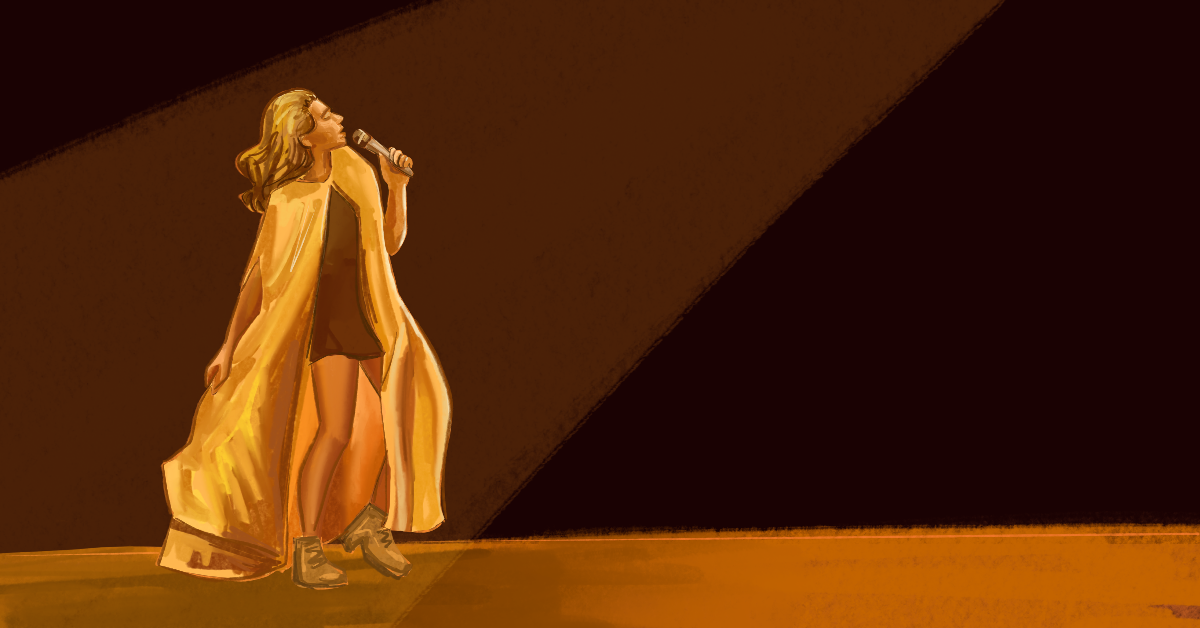Spotlighting the CBC Gem series How to Fail as a Popstar
A story of prevailing with failure, rather than fighting against it.
“Wow, this seems like a great project. I’d love to book this,” was Adrian Pavone’s reaction to the CBC Gem Series, How to Fail as a Popstar. Pavone says they were drawn to be part of the show because it’s about a “Queer Brown kid who’s trying to become an artist and they’re not some Queer Brown stereotype.” Apart from that, Pavone adds that it tells an honest story about failure that speaks to many people. “Failure is universal, but every piece of media seems to be about overcoming failure, whereas this one is about accepting failure, and learning to prevail with failure, rather than in spite of it.”
When it came to the audition process, Pavone says the audition scene itself was more than enough to turn this into an “instant dream role.” Vivek Shraya (the Indian protagonist) tries to impress a white producer and “is immediately pigeon-holed into his Indian-ness.” A half-Guyanese artist, Pavone mentions they’ve experienced that exact scene numerous times, from casting directors to peers to even some family members where they were told “in one way or another, that my approach to being an actor isn’t optimal—that I ought to lean into my Brownness, that I ‘should go do Bollywood!’”
“This story is not about magnifying what the majority population sees when they look at you. It’s about carving your own space in a field with countless barriers,” remarks Pavone.
Upon booking the role, Pavone headed to their nearest Indigo and purchased two of Vivek Shraya’s books. I’m Afraid of Men was the roadmap Pavone used for “real-Vivek’s journey to where she is now.” After watching her past performance videos, listening to her music, even finding playlists of what Pavone believed was Shraya’s favourite music, and reading the one-woman play, How to Fail as a Popstar, Pavone said they were in utter awe of Shraya’s story. “I only hoped I could do the story justice,” comments Pavone.
On set, Pavone studied Shraya as much as they could, despite the pressure of performing in their first lead role in a show. “Vivek herself was a lovely resource, but ultimately, she gave me a lot of free rein in my interpretation of this fictionalised version of her younger self. She’s a true artist in that she deeply believes in the power of collaboration,” says Pavone.
The most challenging part of this role for Pavone was the pressure they put on themselves as an actor. “Oddly, even though the project is about living with failure, I refused myself the right to failure. To me, as the actor, the project was about hope. I mean, isn’t that what the career of every artist centres on? But yes, I put so so much pressure on myself, to the point where it crippled me some days,” Pavone reflects. “I would constantly seek reassurance from Vivek and Vanessa, our director, both of whom were so sweet and encouraging.”
Reflecting on what they enjoyed most about playing this character, Pavone says the role meant so much in so many ways. “I’ve made some beautiful new friendships, I’ve had my own identity and journey validated, I’ve finally got an entire project I can point to and say, ‘Hey I made that!’”
One moment they’ll never forget was from the wrap party. Pavone and Shraya were chatting with another actor, Davin (seen in the last episode as Shraya’s student, Kavi), and at some point, Shraya pointed out how amazing it was that “in that triangle were three Brown Genderqueer artists talking about things other than the fact that we were all Brown and Genderqueer. It was really special.” In that moment, Pavone says, they found what felt like “the rarest, sweetest communities in the world.”
“I owe a lot to this project, but playing a Queer Brown character whose story wasn’t about being Queer and Brown? Top notch. Aces. Oh, also that Vivek and Vanessa were committed to making Brown people unapologetically sexy on TV,” notes Pavone.
When asked what they hope viewers would take away from the show, Pavone says, “I know it’s cliché, but to leave behind anything and anyone who not only doesn’t serve you, but actively hurts you. Is that harsh? I don’t know. I have a feeling a lot of people will get a hold of that message and start dumping friends and family left and right if they fight sometimes. It’s a tough balance. When do you know something is hurting you past what’s okay? How do you know how long to keep trying? It’ll be different for everyone.” The bottom line that Pavone wants viewers to take away is “how okay it is to fail. How okay it is to stick to your guns.”
As a final message for readers, Pavone says their older sister forgot how Pavone warned their family about a make-out and a (semi) nude scene. “Not only did she accidentally have to rewatch the make-out scene like five times because her Wi-Fi wasn’t working, she also screamed and fell off her couch when the nude scene came on,” amuses Pavone.
You can stream How to Fail as a Popstar on CBC Gem and you can follow Pavone on their Instagram.

